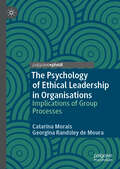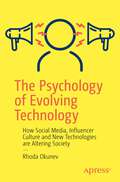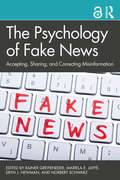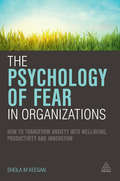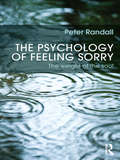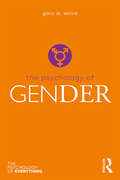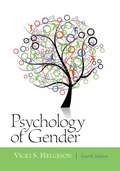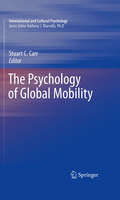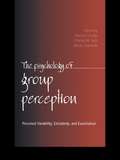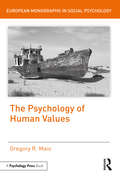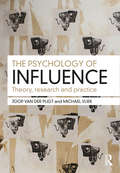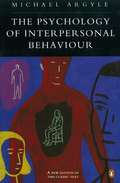- Table View
- List View
The Psychology of Environmental Law (Psychology and the Law)
by Arden Rowell Kenworthey Bilz Linda J DemaineOffers psychological insights into how people perceive, respond to, value, and make decisions about the environmentEnvironmental law may seem a strange space to seek insights from psychology. Psychology, after all, seeks to illuminate the interior of the human mind, while environmental law is fundamentally concerned with the exterior surroundings—the environment—in which people live.Yet psychology is a crucial, undervalued factor in how laws shape people’s interactions with the environment. Psychology can offer environmental law a rich, empirically informed account of why, when, and how people act in ways that affect the environment—which can then be used to more effectively pursue specific policy goals. When environmental law fails to incorporate insights from psychology, it risks misunderstanding and mispredicting human behaviors that may injure or otherwise affect the environment, and misprescribing legal tools to shape or mitigate those behaviors.The Psychology of Environmental Law provides key insights regarding how psychology can inform, explain, and improve how environmental law operates. It offers concrete analyses of the theoretical and practical payoffs in pollution control, ecosystem management, and climate change law and policy when psychological insights are taken into account.
The Psychology of Ethical Leadership in Organisations
by Catarina Morais Georgina Randsley de MouraUnderstanding the effects of and psychology behind ethical and unethical leadership decisions can have a lasting and far reaching effect on any working environment. This book utilizes social identity theory and applied research to discuss the implications and applications of ethical and unethical leadership to work groups and organisations. The authors argue that improving ethicality results in healthier and more productive relationships between leaders and employees, and between employees and the organisation, which can impact positively on the success of the organisation as a whole.The book explores the benefits of ethical leadership and how to deal with unethical leaders, as well as how and why teams react to different types of leadership. The concluding chapter suggests several strategies for interventions that organisations can adopt to improve their ethical leadership frameworks. The book is essential reading for academics and professionals involved in workplace psychology and ethics as well as anyone interested in learning about the effects of ethics on leadership.
The Psychology of Evolving Technology: How Social Media, Influencer Culture and New Technologies are Altering Society
by Rhoda OkunevTechnological innovations have advanced at an incredible speed since the introduction of the computer that it has altered the fabric of our society. The possession of computers, smart-devices, along with social media, texting and video games, is now an intimate part of the structure of our culture. This book is a framework to start a conversation on how technology is changing our lifestyles and transforming our world. There is now an entire generation that has been using technology through the most delicate developmental time in their lives. This book presents how to look at the cognitive and psychosocial developmental stages and what are the age-appropriate milestones and factsheet of behaviors at different ages. It provides insight into the strength and vulnerable characteristics at each stage and the prevalence of some negative conditions in our society. You will gain a perspective of the encouraging and challenging aspects of computer learning, smart devices, and how to start and keep the conversation going from infancy to adulthood in order to keep and maintain your virtues and ways to circumvent unfavorable consequences. In short, The Psychology of Evolving Technology looks at how cutting-edge and revolutionary high technologies have disrupted our society through its many luxuries and conveniences and how it has altered the outlook of our values, privileges, and expectations. What You'll LearnDetermine what adjustments should be made to regulate new innovations to allow them to succeed See how development stages in a child now interact with technologyReview how social media and influencer culture are changing the way we see ourselves in society Who This Book Is For All readers curious about the effect of technology on individuals, growing children, and the fabric of society
The Psychology of Extremism: A Motivational Perspective (Frontiers of Social Psychology)
by Arie W. Kruglanski Ewa Szumowska Catalina KopetzThis ground-breaking book introduces a new model of extremism that emphasizes motivational imbalance among individual needs, offering a unique multidisciplinary exploration of extreme behaviors relating to terrorism, dieting, sports, love, addictions, and money. In popular discourse, the term ‘extremism’ has come to mean largely ‘violent extremism’, but this is just one of many different types: extreme sports, extreme diets, political and religious extremisms, extreme self-interest, extreme attitudes, extreme devotion to a cause, addiction to substances, or behavioral addiction (to videogames, shopping, pornography, sex, and work). But do these descriptions have a deeper meaning? Do they reveal a common psychological dynamic? Or are they merely a mode of things about phenomena that have little in common? Bringing together world-leading psychologists from a variety of disciplines, the book uses a brand-new model to examine different expressions of extremism, at different levels of analysis (brain, hormones, and behavior), in order not merely to describe such behaviors but also to explain their occurrence, and the conditions under which they may be likely to emerge. Also including suggestions for ways in which extremism could be counteracted, and to what extent it appears to be harmful to individuals and society, this is essential reading for students and academics in psychology and behavioral sciences.
The Psychology of Fake News: Accepting, Sharing, and Correcting Misinformation
by Rainer Greifeneder; Mariela E. Jaffé; Eryn J. Newman; Norbert SchwarzThis volume examines the phenomenon of fake news by bringing together leading experts from different fields within psychology and related areas, and explores what has become a prominent feature of public discourse since the first Brexit referendum and the 2016 US election campaign. Dealing with misinformation is important in many areas of daily life, including politics, the marketplace, health communication, journalism, education, and science. In a general climate where facts and misinformation blur, and are intentionally blurred, this book asks what determines whether people accept and share (mis)information, and what can be done to counter misinformation? All three of these aspects need to be understood in the context of online social networks, which have fundamentally changed the way information is produced, consumed, and transmitted. The contributions within this volume summarize the most up-to-date empirical findings, theories, and applications and discuss cutting-edge ideas and future directions of interventions to counter fake news. Also providing guidance on how to handle misinformation in an age of “alternative facts”, this is a fascinating and vital reading for students and academics in psychology, communication, and political science and for professionals including policy makers and journalists.
The Psychology of False Beliefs: Collective Delusions and Conspiracy Theories (Sydney Symposium of Social Psychology)
by Joseph P. ForgasThis exciting book outlines the fascinating social psychology of false beliefs and tribal delusions, examining the common human tendency to create and maintain collectively shared belief systems that have no foundation in reality. Bringing together leading international researchers, contributors explore how evolutionary, biological, cognitive, and social variables shape the creation and maintenance of widely shared but obviously false belief systems. The authors review how psychological processes promote the formation and maintenance of fallacious beliefs and discuss the philosophical and epistemological criteria we can use to classify some beliefs as false, and others as true.The chapters draw on many core areas of contemporary social life where false beliefs are of topical interest, highlighting the applied implications of this line of research. Topics include political polarisation, false narratives about group differences, pandemic conspiracy theories, fallacious theories in academia and the role of the media and the internet in creating distorted narratives.This book is engagingly written and will be of great interest to students and researchers in social psychology and the social sciences, as well as anyone seeking to understand one of the most intriguing issues that shape human social life.
The Psychology of Fear in Organizations
by Sheila KeeganIn the context of global economic recession, fear has become institutionalized in many organizations, both in the private and public sectors. Board directors are under pressure from shareholders, senior executives are attempting to maintain sales in a nervous market and many people are concerned about job security and maintaining their living standards. This book shows how fear manifests itself in large organizations, how it impacts on the workforce and how by reducing our willingness to take risks and to innovate, it can inhibit economic growth and innovation, at both an individual and corporate level. The Psychology of Fear in Organizations examines the psychological barriers to innovation and presents initiatives to loosen the paralysis caused by the economic downturn.
The Psychology of Fear in Organizations: How to Transform Anxiety into Well-being, Productivity and Innovation
by Sheila KeeganIn the context of global economic recession, fear has become institutionalized in many organizations, both in the private and public sectors. Board directors are under pressure from shareholders, senior executives are attempting to maintain sales in a nervous market and many people are concerned about job security and maintaining their living standards. The Psychology of Fear in Organizations shows how fear manifests itself in large organizations, how it impacts on the workforce and how by reducing our willingness to take risks and to innovate, it can inhibit economic growth and innovation, at both an individual and corporate level. The Psychology of Fear in Organizations examines the psychological barriers to innovation and presents initiatives to loosen the paralysis caused by the economic downturn. It presents psychological theory in an accessible way to provide a better understanding of the needs and fears of people and how they can be supported to improve productivity and innovation. Online supporting resources include lecture slides on how to harness fear to fuel innovation.
The Psychology of Feeling Sorry: The Weight of the Soul
by Peter RandallCan feeling genuinely sorry enable an important healing experience? Can relieving the weight of guilt restore a general sense of self-worth? Can an individual's dawning awareness give birth to feelings of remorse; perhaps even to acts of repentance? The concepts of betrayal, vengeance and forgiveness have long been a major part of religious doctrine throughout the world. However, only in recent times has the impact of these emotions become of interest to those involved in psychological study. In The Psychology of Feeling Sorry, Peter Randall links contemporary psychological research with religious teachings and doctrine that have provided spiritual guidance for hundreds of years. Illustrated with explanatory narratives, Randall fuses religious precepts with psychological theory concerning one of the least understood but most common of human emotions; feeling bad about one's 'sins'. Using an eclectic approach Randall explores how much of what is believed within the domain of faith is now supported by modern psychological research. This book will be of interest not only to those with religious beliefs, but to psychologists, psychotherapists, students, and anyone with an interest in the intersection of psychology, psychotherapy, and theology.
The Psychology of Financial Consumer Behavior (International Series on Consumer Science)
by Dominika MaisonThis book stresses the psychological perspective in explaining financial behavior. Traditionally, financial behaviors such as saving, spending, and investing have been explained using demographic and economic factors such as income and product pricing. The consequence of this way of thinking is that financial institutions view their clients mostly from the perspective of their income. By taking a psychological approach, this book stresses the perspective of consumers confronted with a quickly changing financial world: the changing of financial offers and products (savings, investments, loans), the changing of payment methods (from cash to cheques, cards and mobile payments), the accessibility and temptation of goods, and the changing of insurance and pension systems.The Psychology of Financial Consumer Behavior provides insight into the thought processes of consumers in a variety of financial topics. Coverage includes perceptions of wealth, the pleasure or pain of spending, cashless transactions, saving and investing, loans, planning for the future, taxes, and financial education. The book holds appeal for researchers, professionals, and students in economics, psychology, economic psychology, marketing and consumer science, or anyone interested in financial behaviors.
The Psychology of Food Marketing and Overeating
Integrating recent research and existing knowledge on food marketing and its effects on the eating behaviour of children, adolescents, and adults, this timely collection explores how food promotion techniques can be used to promote healthier foods. Numerous factors influence what, when, and how we eat, but one of the main drivers behind the unhealthy dietary intake of people is food marketing. Bringing together important trends from different areas of study, with state-of-the-art insights from multiple disciplines, the book examines the important factors and psychological processes that explain the effects of food marketing in a range of contexts, including social media platforms. The book also provides guidelines for future research by critically examining interventions and their effectiveness in reducing the impact of food marketing on dietary intake, in order to help develop new research programs, legislation, and techniques about what can be done about unhealthy food marketing. With research conducted by leading scholars from across the world, this is essential reading for students and academics in psychology and related areas, as well as professionals interested in food marketing and healthy eating.
The Psychology of Gender (The Psychology of Everything)
by Gary WoodWhat is the difference between sex and gender? What is the impact of gender-role stereotypes on our lives, our relationships and the world? What does gender mean to you? The Psychology of Gender looks at our biology, history and culture to consider the impact of gender roles and stereotypes, and addresses the 'dilemmas' we have regarding gender in a post-modern world. It offers a unique perspective on gender through storytelling and explores ideas around transgender and cisgender identities and androgyny, tackling hidden assumptions and helping us make sense of the world of gender. By examining the future of gender, The Psychology of Gender offers a platform for further exploration, and arrives at a new psychology of gender that emphasises relationships and helps us to understand our own gender identity and that of those around us.
The Psychology of Gender: Fourth Edition
by Vicki S. HelgesonUnlike other gender texts, Psychology of Gender focuses equally on both men and women, drawing from empirical research and conceptual discussions.The book includes research and discussions surrounding gender in the areas of psychology, sociology, anthropology, medicine, and public health. It reviews the research from multiple perspectives, but emphasizes the implications of social roles, status, and gender-related traits, particularly for relationships and health–areas that are central to students' lives and that have a great impact on their day-to-day functioning. The text is designed for upper-level undergraduate/graduate-level gender-focused courses in a variety of departments.
The Psychology of Global Crises and Crisis Politics: Intervention, Resistance, Decolonization (Palgrave Studies in the Theory and History of Psychology)
by Martin Dege Irene StrasserThis edited volume brings together some of the most prominent scholars in the fields of theoretical, critical, and political psychology to examine crisis phenomena. The book investigates the role of psychology as a science in times of crisis, discusses how socio-political change affects the discipline and profession, and renders psychological interventions as forms of political action.The authors examine how notions of crisis and the interpretation of crisis scenarios are heavily intertwined with governmental and state interests. Seeking to disentangle individual subjectivity, subjectification, and science as forms of politics, the volume works toward an explicit goal to decolonize psychology. The chapters elaborate on the importance of the psychological sciences in times of crisis and the role of psychologists as practitioners. Ultimately, the diverse contributions underline the connection of scientific theory, practice, and politics.Interdisciplinary in scope and wide-ranging in its perspectives, this timely work will appeal to students and scholars of theoretical and political psychology, critical psychology, and cultural studies.
The Psychology of Global Mobility
by Stuart C. CarrHuman mobility has been a defining feature of human social evolution. In a global community, the term "mobility" captures the full gamut of types, directions, and patterns of human movement. The psychology of mobility is important because movement is inherently behavioral. Much of the behavioral study of mobility has focused on the negative - examining the trauma of forced migration, or the health consequences of the lack of adaptation - but this work looks into the benefits of mobility, such as its impact on career capital and well-being. Recent years have witnessed a phenomenal increase in efforts to understand human mobility, by social scientists, think-tanks, and policymakers alike. The book focuses on the transformational potential of mobility for human development. The book details the historical, methodological, and theoretical trajectory of human mobility (Context), followed by sections on pre-departure incentives and predispositions (Motivation), influences on acculturation, health and community fit (Adjustment), and changes in career capital, overcoming bias, and diaspora networks (Performance).
The Psychology of Group Perception: Perceived Variability, Entitativity, And Essentialism
by Charles M. Judd Olivier Corneille Vincent YzerbytThis groundbreaking work by leading social psychologists, who have all contributed in important ways to the psychology of group perception, focuses in particular on three interrelated issues: (1) whether groups are seen to be diverse or relatively homogeneous; (2) whether groups are seen as real and stable or only transitory and ephemeral; and (3) whether group membership derives from some essential quality of the members or rather is based on social constructions.
The Psychology of Human Leadership: How To Develop Charisma and Authority
by Erich Dihsmaier Michael PaschenThe book seamlessly links fundamental insights and practical approaches to address the most important leadership problems and challenges. Each of the 11 chapters takes a close look at a specific leadership aspect and explains how to develop personal leadership qualities, such as charisma, the ability to motivate others, assertiveness, and how to overcome crises and conflicts to create new structures. Ethical questions and possible negative developments in connection with leadership and power are also examined. Unlike conventional leadership manuals, this book on leadership goes beyond the standard 'recipes' and models by providing clear trains of thought as well as a psychological and philosophical basis, and by focusing on major achievements in terms of leadership, it creates a more profound understanding and holistic view of the subject of leadership, while promoting a genuine fascination for it.
The Psychology of Human Values (European Monographs in Social Psychology)
by Gregory R MaioThis original and engaging book advocates an unabashedly empirical approach to understanding human values: abstract ideals that we consider important, such as freedom, equality, achievement, helpfulness, security, tradition, and peace. Our values are relevant to everything we do, helping us choose between careers, schools, romantic partners, places to live, things to buy, who to vote for, and much more. There is enormous public interest in the psychology of values and a growing recognition of the need for a deeper understanding of the ways in which values are embedded in our attitudes and behavior. How do they affect our well-being, our relationships with other people, our prosperity, and our environment? In his examination of these questions, Maio focuses on tests of theories about values, through observations of what people actually think and do. In the past five decades, psychological research has learned a lot about values, and this book describes what we have learned and why it is important. It provides the first overview of psychological research looking at how we mentally represent and use our values, and constitutes important reading for psychology students at all levels, as well as academics in psychology and related social and health sciences.
The Psychology of Human-Computer Interaction
by Stuart K. Card, Thomas P. Moran and Allen NewellDefines the psychology of human-computer interaction, showing how to span the gap between science & application. Studies the behavior of users in interacting with computer systems.
The Psychology of Industry (Psychology Revivals)
by James DreverFirst published in 1921 and revised here in 1947, The Psychology of Industry was intended to make available for the ordinary person, rather than specialists in either psychology or economics, the results of recent experimental work in psychology at the time, so far as these had a direct bearing on problems of industry and commerce. The revised edition intended to emphasize principles, rather than details, to bring out the relation of psychology to economics, and of education to industry. Stress is also laid on the new urgency which the Second World War had given to many of the problems discussed. Today it can be read in its historical context.This book is a re-issue originally published in 1921. The language used is a reflection of its era and no offence is meant by the Publishers to any reader by this re-publication.
The Psychology of Influence: Theory, research and practice
by Joop Van Pligt Michael VliekWhether it’s our choice of a new car or what we think about our neighbours, our opinions and attitudes are a way of negotiating the world around us. The Psychology of Influence explores how these preferences and behaviours are influenced and affected by the messages we receive in daily life. From consumer choices to political, lifestyle and financial decisions, the book examines how and why we may be influenced by a range of sources, from written text and television to social media and interpersonal communication. In a field that has fascinated scholars since Plato, the book addresses the key questions across cognitive, social and emotional domains: When do arguments become persuasive? What influence do role models have? What role do simple rules of thumb, social norms or emotions play? Which behaviours are difficult to influence, and why? Covering topics from attraction, prejudice and discrimination to reward, punishment and unconscious bias, The Psychology of Influence will be invaluable reading for students and researchers across a range of areas within applied and social psychology, as well as those in political science, communications, marketing and business and management.
The Psychology of Innovation in Organizations
by David H. Cropley Arthur J. Cropley Cropley, David H. and Cropley, Arthur J.In today's highly competitive market, organizations increasingly need to innovate in order to survive. Drawing on a wealth of psychological research in the field of creativity, David H. Cropley and Arthur J. Cropley illustrate practical methods for conceptualizing and managing organizational innovation. They present a dynamic model of the interactions between four key components of creativity - product, person, process, and press - which function as building blocks of innovation. This volume sheds new light on the nature of innovative products and the processes that generate them, the psychological characteristics of innovative people, and the environments that facilitate innovation. It also fills a significant gap in the current literature by addressing the paradoxical quality of organizational innovation, which may be both helped and hindered by the same factors. The authors demonstrate that with proper measurement and management, organizations can effectively encourage individuals to produce and take advantage of novel ideas.
The Psychology of Insecurity: Seeking Certainty Where None Can Be Found (Sydney Symposium of Social Psychology)
by Klaus Fiedler William D. Crano Joseph P. ForgasInsecurity is an inevitable part of being human. Although life is insecure for every organism, humans alone are burdened by knowing that this is so. This ground-breaking volume features contributions by leading international researchers exploring the social psychology of insecurity and how existential, metaphysical, and social uncertainty influence human social behaviour. Chapters in the book investigate the psychological origins of insecurity, evolutionary theorizing about the functions of insecurity, the motivational strategies people adopt to manage insecurity, self-regulation strategies, the role of insecurity in the formation and maintenance of social relationships, and the influence of insecurity and uncertainty on the organization of larger social systems and public affairs. The chapters also discuss how insecurity influences many areas of contemporary social life, highlighting the applied implications of this line of research. Topics covered include the role of insecurity in social communication, social judgments, decision-making, group identification, morality, interpersonal behaviour, relationships, attitudes, and many applied aspects of social life and politics where understanding the psychology of insecurity is of critical importance. This accessible and engaging book will be of interest to students, researchers, and practitioners as a textbook or reference book in behavioural and social science fields, as well as to a broad spectrum of intelligent lay audiences seeking to understand one of the most intriguing issues that shapes human social life.
The Psychology of Interpersonal Behaviour
by Michael ArgyleThe first edition of this book outlined what amounted to a breakthrough in the analysis of social behaviour. Since then it has become widely used as an introductory textbook of social psychology. It is invaluable to anyone interested in the subject or whose work involves dealing with people, as well as anyone who wants to know how to make friends and influence people. For this new, fifth edition, Michael Argyle includes the latest research on non-verbal communication, social skills and happiness.
The Psychology of Interpersonal Relations
by F. HeiderPublished in the year 1982, The Psychology of Interpersonal Relations is a valuable contribution to the field of Social Psychology.

